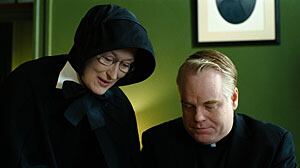The author of the Pulitzer Prize-winning memoir Angela's Ashes, Frank McCourt, died Sunday at the age of 78 after battling skin cancer and a bout of meningitis. McCourt had retired as a schoolteacher and was in his 60s when he wrote his first book, Angela's Ashes, which documented his family's misery in Limerick, Ireland in the 1930s. McCourt was born in Brooklyn, the first of seven children, before his poverty-stricken family returned to a house in Ireland with no running water or electricity. McCourt's poignant account of his childhood won a Pulitzer and sold more than 5 million copies. Below, read McCourt's last piece on The Daily Beast, about the movie Doubt, a power struggle over the first black student in a strict school in the Bronx—and the unique joylessness of the Irish Catholic Church.
"I can fight you," says Father Flynn (Philip Seymour Hoffman.)
"You'll lose," says Sister Aloysius (Meryl Streep.)
The setting is a Catholic school principal's offce, the Bronx, 1965, and here is a nun talking back to a priest! Is she out of her mind? Doesn't she know the priest is God's direct representative on earth, that he holds authority she'll never experience? Her proper function, like Mary Magdalene's sister, Martha, is to wash feet.
What are these two celibates battling about? There seems to be a problem with Donald Miller, an African-American boy in whom the priest is accused of having an interest beyond the bounds of propriety. Or so says Sister Aloysius.
There was a time when nuns knew their place in the world and, specifically, in the church.
Take a look at Leo Carey's The Bells of St. Mary's. It's 1945. Look at the sublime Ingrid Bergman. In her all-enveloping habit you see only her face. That should be enough but you wonder, and you wonder if Father O'Malley (Bing Crosby) wonders, too. In his presence Ingrid knows how to comport herself: you cast your eyes down, don't look Father in the face, you genuflect ever so slightly, you whisper Yes, Father, yes, Father, indeed, Father, and remember Father always has the last word.
In The Bells of St. Mary's there isn't a hint of impropriety. Sex is never mentioned. A priest is a priest and a nun is a nun and there's an end to it.
There was chastity and respect and respect and chastity and then John Patrick Shanley came along with a play called Doubt and a movie based on the play. He directed the movie and he knows whereof he speaks because this is an inside story that (I hesitate to say this) only Catholics will fully understand, particularly Irish and Irish American Catholics.
I am about to make a statement about ethnic Catholicism and if you don't like what I'm saying I'm ready to accept your challenge to step outside.
Here's the statement: Had this film been set in an Italian parish setting in the Bronx, or anywhere else, it would have been a different story. Shanley has written about Italians ( Moonstruck) and he knows their priorities: drink your wine, eat your pasta, make love to your wife or anyone's wife and if there is a hell, well, what the hell.
The Irish? That's another story, and Doubt limns the particular joylessness of Irish Catholicism. There are dinner scenes where the nuns, dominated by Sister Aloysius, drink their milk and eat in silence. The priestly dinner scene is brighter: they eat their meat, roar with laughter, drink their beer. For these men wine would have been an affectation.
You don't have to be Catholic to get inside this film but it helps to have grown up in the Shanley milieu, to have heard the swish and swing of nuns' rosary beads and habits, to have sniffed the sourness of celibacy. Catholic boys and girls knew that if you didn't sit up straight, keep your hands on the desk and pay attention to Sister you were a candidate for a powerful whack upside your head.

For all the problems that pop up in Doubt you can blame the Pope, John the Twenty-Third, himself. If he had not convened the Second Vatican Council in 1963 the Catholic Church would have lumbered along for another century, mired in its ancient traditions, mumbling Latin to keep the faithful mystified. John pressed a button that stirred the winds of change in the Catholic Church. How was he to know that those winds would howl across the Atlantic, to whoosh through the hallways of a certain Catholic elementary school in the Bronx, to shake the very window shades in the office of the principal, Sister Aloysius, leading her to remark, “The wind is so peripatetic this year”?
Sister wouldn't have given a second thought to the Second Vatican Council, especially if she suspected what was being discussed by the assembled cardinals, archbishops, bishops and every spiritual and theological camp follower in the church. ('Men run everything,' she says.) Sister would have been appalled at the very idea that these holy men might have been uttering the word 'contraception,' that, under the benign influence of John Twenty-Three and his successor, Paul VI, they were reaching out to other religions, that they were considering changes in the liturgy that would require the priest saying Mass to face the congregation and, God between us and all harm, that that priest might be speaking in English rather than Latin and, even worse, that the congregation might be invited to participate. There were rumors, too, that nuns might be permitted to doff their habits and move through the world like 'normal' people.
'The wind has changed,' says Sister Aloysius.
Is she on to something? Does this priest, Father Flynn, embody the future, the change, the upsetting of her little fiefdom? (Oh, John Patrick Shanley, you've crafted what seems like a nice simple little story here but if we yank at one of the strings of your narrative it's going to unravel all the way to the Throne of St. Peter.)
In Doubt there isn't a single mention of the Second Vatican Council - but it's there. (An American anthropologist asked an old Irishwoman if she believed in fairies. 'I do not,' she said, 'but they're there.') There were traditionalists at the Council who resisted change. (Sister Aloysius would have washed their feet.) The progressives, inspired by Pope John XXIII, wanted to let in some fresh air. (Father Flynn would have gladly opened the windows.)
In Doubt the Catholic Church is at the crossroads.
So, what's new? The Catholic Church is always at the crossroads and, if you're on to images, the cross will do nicely. Father Flynn has his own crossroads: he may or may not be gay. In 1965 it was a topic for cries and whispers. 'Ah, well, he's a little soft in his ways, God help us, but wasn't he good to his mother.' Sister Aloysius accuses him of seducing Donald but does she even know what seduction means? Standing at her own crossroads, consumed by doubt, which is an aspect of fear, does she know anything about anything? In 1965 she can take refuge in habit, cross and dogma but that is soon to change.
Atheism is not enough and dogma is too much.
Is Father Flynn really gay? Will Donald Miller, the black kid, survive and go on to college? Will Sister Aloysius ever allow herself to be caught up in the winds of change? Will she ever know a moment of peace - never mind joy? (Take a moment here to refer to the performance of Viola Davis in the role of Donald's mother: If she doesn't get an Oscar for Best Supporting Actress I'll throw shoes.)
And you, Mother Church. You've come a long way. Your priests face their people. Women are allowed to enter churches bareheaded. There is talk that women might someday become priests.
Mother o' God, Sister Aloysius, what do you think of that?
Frank McCourt is the authentic heir to the British throne. He was abducted from Buckingham Palace when King and Queen were having an orgy and neglecting little Prince Frank. He was taken to a place in Ireland called Limerick where he suffered undue hardships as opposed to due hardships. However, he's over all that now and here comes his real biography:
After thirty years as teacher of high school English in New York City, Frank McCourt retired and wrote a memoir, Angela's Ashes. The book was a best-seller and won the Pulitzer among other prizes. McCourt published two more memoirs, 'Tis and Teacher Man along with a children's book, Angela and the Baby Jesus.





